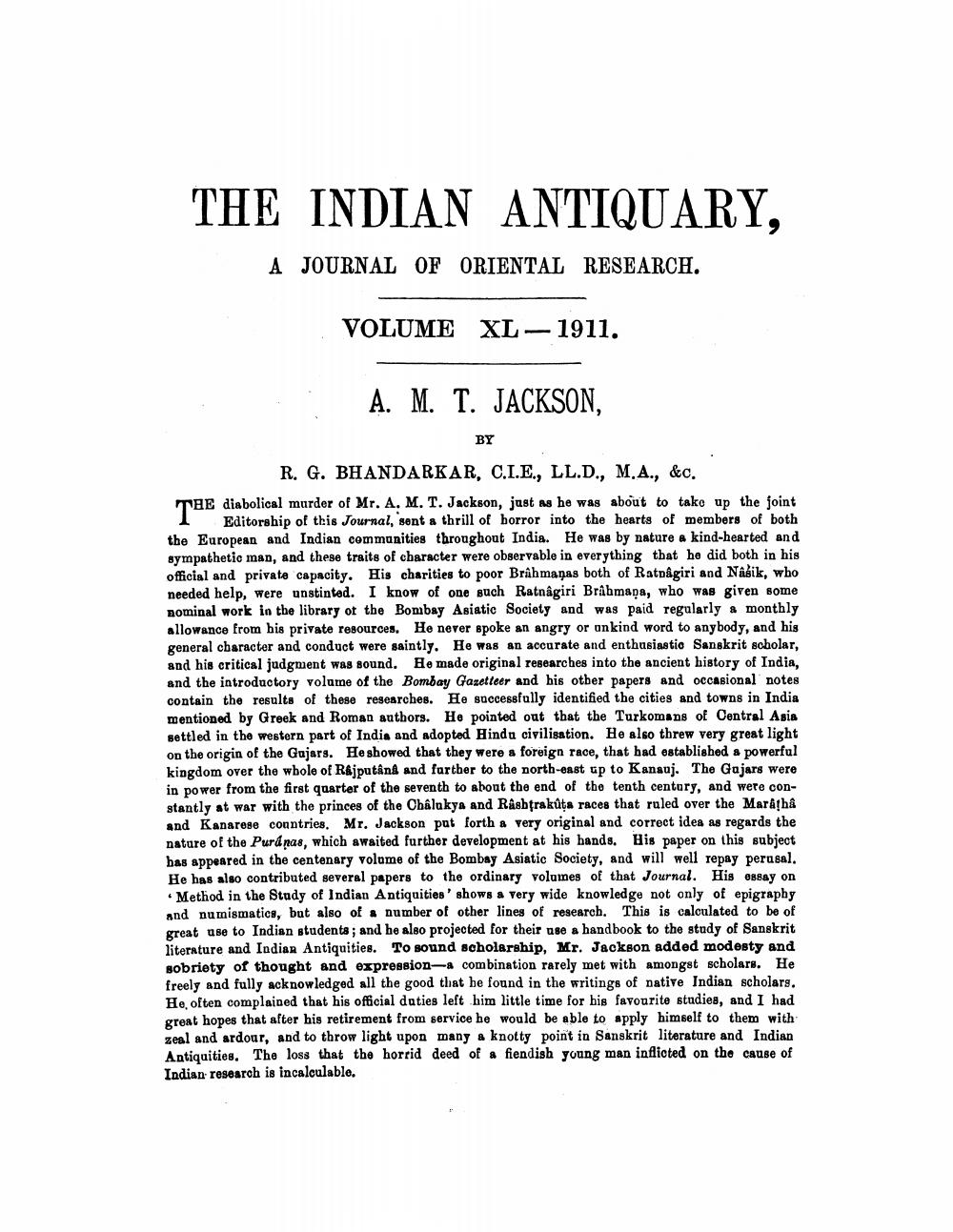Book Title: Indian Antiquary Vol 40 Author(s): Richard Carnac Temple, Devadatta Ramkrishna Bhandarkar Publisher: Swati Publications View full book textPage 7
________________ THE INDIAN ANTIQUARY, A JOURNAL OF ORIENTAL RESEARCH. VOLUME XL— 1911. A. M. T. JACKSON, BY R. G. BHANDARKAR, C.I.E., LL.D., M.A., &c. THE diabolical murder of Mr. A. M. T. Jackson, just as he was about to take up the joint 1 Editorship of this Journal, sont a thrill of borror into the hearts of members of both the European and Indian communities throughout India. He was by nature a kind-hearted and sympathetic man, and these traits of character were observable in everything that he did both in his official and private capacity. His charities to poor Brahmaņas both of Ratnagiri and Nasik, who needed help, were unstinted. I know of one such Ratnagiri Brahmana, who was given some nominal work in the library of the Bombay Asiatic Society and was paid regularly a monthly allowance from his private resources. He never spoke an angry or unkind word to anybody, and his general character and conduct were saintly. He was an accurate and enthusiastio Sanskrit scholar, and his critical judgment was sound. He made original researches into the ancient history of India, and the introductory volume of the Bombay Gazetteer and his other papers and occasional notes contain the results of these researches. He successfully identified the cities and towns in India mentioned by Greek and Roman authors. He pointed out that the Turkomans of Central Asia settled in the western part of India and adopted Hinda civilisation. He also threw very great light on the origin of the Gujars. Hoshowed that they were a foreign race, that bad ostablished a powerful kingdom over the whole of Rajputând and farther to the north-east up to Kansuj. The Gajars were in power from the first quarter of the seventh to about the end of the tenth century, and were constantly at war with the princes of the Châlukya and Rashtrakûts races that ruled over the Markịhâ and Kanarese countries. Mr. Jackson pat forth a very original and correct idea as regards the nature of the Puranas, which awaited further development at his hands. His paper on this subject has appeared in the centenary volume of the Bombay Asiatic Society, and will well repay perasal. He has also contributed several papers to the ordinary volumes of that Journal. His essay on • Method in the Study of Indian Antiquities' shows a very wide knowledge not only of epigraphy and numismatics, but also of a number of other lines of research. This is calculated to be of great use to Indian students; and he also projected for their use a handbook to the study of Sanskrit literature and Indian Antiquities. To sound scholarship, Mr. Jackson added modesty and sobriety of thought and expression--a combination rarely met with amongst scholars. He freely and fully acknowledged all the good that be found in the writings of native Indian scholarg. He often complained that his official daties left him little time for his favourite studies, and I had great hopes that after his retirement from service he would be able to apply himself to them with zeal and ardour, and to throw light upon many a knotty point in Sanskrit literature and Indian Antiquities. The loss that the horrid deed of a fiendish young man inflicted on the cause of Indian research is incalculable,Page Navigation
1 ... 5 6 7 8 9 10 11 12 13 14 15 16 17 18 19 20 21 22 23 24 25 26 27 28 29 30 31 32 33 34 35 36 37 38 39 40 41 42 43 44 45 46 47 48 49 50 51 52 53 54 55 56 57 58 59 60 61 62 63 64 65 66 67 68 69 70 71 72 ... 388
